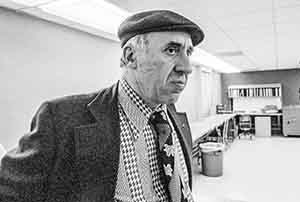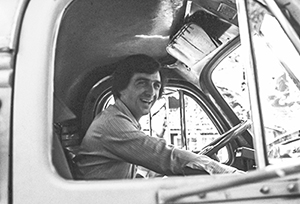|
welcome to JohnBendel.com.
THE RECORD, Hackensack, N.J., op-ed in the opinion section, February 24, 2002 End of the Road for
a University on Wheels They've closed my alma mater and taken a piece of my heart. My school was A-P-A Transport Corp. of North Bergen, N.J. -- a great place to learn if ever there was one. A-P-A Transport will close its doors this week, idling as many as 800 trucks and 1,700 workers throughout the Northeast, but mostly here in New Jersey. I began driving a Mack straight truck from A-P-A's sprawling terminal off Tonnelle Avenue in 1967. Every A-P-A truck was a classroom and no classroom afforded a better look at the real world. Driving for A-P-A, I picked up and delivered shoes, specialty groceries, vehicle parts, toys, bags of cocoa beans and lamp black, electronic components, dangerous chemicals, flagpoles, outboard motors, guns, fine lingerie and other commodities too many to name. I delivered maintenance supplies to Sing-Sing and brass souvenirs to the observation deck of the Empire State Building (where they disputed the inside-delivery surcharge). I saw American business through the back door and learned which companies put on a slick face up front but ran incompetent operations behind the facade. I also saw great companies that ran right - none more so than A-P-A itself. Back then A-P-A's founder, president, provost, chancellor and dean of students was the memorable Arthur Imperatore, a man better known these days for reviving New York ferry traffic and creating New York Waterways. Imperatore earned his entrepreneurial stripes building A-P-A. Latter-day trucking legends have risen in the 20 go-go years since deregulation, but even now Imperatore and A-P-A have them beat.
Imperatore nurtured A-P-A during the 1950s and '60s in the densely packed neighborhoods of Hudson County where rigid, often corrupt unions ruled. An overbearing Interstate Commerce Commission stood just beyond the unregulated commercial zone of New York City, ready to prevent any upstart trucker from serving even the nearby suburbs, never mind adjoining states. Imperatore stood up to unions, honoring contracts but demanding that his workers honor their obligations. He required -- and for the most part he got -- an honest day's work for an honest day's pay. He painstakingly bought into nearby markets, acquiring operating rights from carriers who were less successful. Imperatore was a real innovator. In the 1960s, he installed early data recorders on his trucks; every day's work was examined and every driver rated for that day's efficiency. Unhappy with the quality of job applicants -- especially experienced drivers -- Imperatore began an intensive training program long before other carriers. To protect A-P-A from criminal offenders whose records were off-limits to potential employers, Imperatore's security department clipped newpapers in its operating area, cross-referencing reported arrests with job applicants. For many years Imperatore was so cautious about new hires that he insisted on interviewing every potential new driver personally. Candidates reached that final interview only after a rugged fifteen-day on-the-job trial, a thorough physical, a lie-detector test, handwriting analysis and who knows what else. Only with Imperatore's okay could you punch in for a sixteenth day and gain a spot at the bottom of A-P-A's seniority list. Like every good business legend, Imperatore provided theater. He threw elaborate employee parties and during the 1970s took the whole company on trips and cruises. He staged fits of temper for effect, but more often his tantrums were real and even cruel. Imperatore once boasted to a reporter that he fired a driver for slouching across the parking lot on his way to punch out. On the other hand, Imperatore was genuine. He used the same words as other business people -- integrity, dedication, spirit, commitment, etc. For them it was empty business-speak. Imperatore was serious. He even insisted that the company's first employee publication be called ``Wonderful News,'' which sounded more like a version of the New Testament than a company newsletter. A-P-A drivers in groups joked about Arthur's industrial-strength cheerleading, but privately we signed on. Other union drivers distained A-P-A. Some bragged of idling away hours at the diner and earning overtime anyway. But A-P-A drivers shrugged off the jibes and kept working. It wasn't just the data recorders that kept us honest. Even in those cynical times, it was a matter of pride to work for the demanding Arthur Imperatore. Despite his tough stance, Imperatore was not anti-union. He was anti-corruption, anti-abuse and anti-slacker. In my time at A-P-A drivers worked hard and were paid well. A-P-A's union-wage pay checks supported families, bought homes and sent kids to college. Sadly, today's trucking industry doesn't compare. A-P-A succeeded far longer than might have been expected. Before 1980, there were hundreds of unionized, regional carriers like A-P-A. When the end finally came A-P-A was the very last of its kind in the country. I doubt that made it any easier for Imperatore. His adopted son Armand Pohan, A-P-A's president, sent a letter announcing the closing to employees. "The company has been part of my life since I was a little boy. You cannot begin to imagine what it has meant to me and to Arthur Imperatore. We will always treasure the memories of the people with whom we have worked and laughed, and sometimes even fought. And we will always think of this day as the saddest of our lives," Pohan wrote. It was a sad day for us A-P-A graduates too.
|

